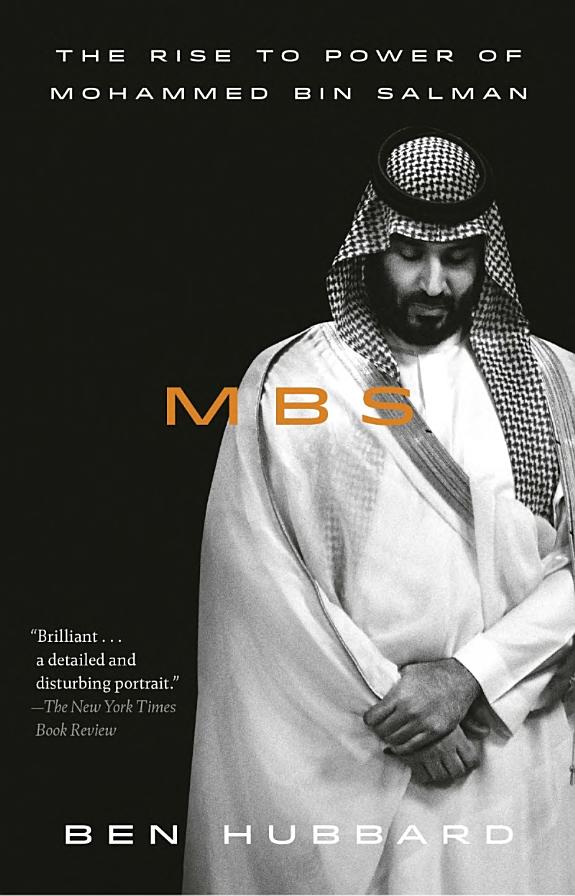
Armchair travel around the world!
Start your reading adventures with our FREE Reading Atlas.

- Around the World in 14 Books
- 7 Thrilling Book Series
- 6 Audiobooks That Are Like Theater For Your Ears



This gripping reportage (384 pages) was published in March of 2020 by Tim Duggan Books. The book takes you to modern Saudi Arabia. David read MBS and loved it; it wouldn't be on our site if he didn't recommend it.
This reportage about the life of the heir apparent to the Kingdom is exceptionally well-written, and phew! it’s a lot.
Mohammed Bin Salman — known as MBS — is currently the Saudi Prime Minister and is one of the most powerful men on Earth. Son of an ailing king, he’s effectively been calling all the shots in Saudi Arabia since about 2017. He didn’t reach this position of power by virtue of birth order: He’s his father’s seventh son — but through ambition, tenacity, and the disappearance of more than a few rivals in the middle of the night, MBS has arrived.
The first half of this book is about his childhood and ascension. It could have been a confusing labyrinth of names and dates, but it is not. It’s a life story well told.
Then you arrive at the question, Well, what’s he going to do now that he’s rich and powerful? And the author Ben Hubbard delivers a very complete answer. Part of the answer is ‘enjoying being a rich person.’ What’s the use of being vastly wealthy if you can’t have fun occasionally?
Example: One afternoon in 2015, MBS impulse-purchased a yacht. It’s one of the largest in the world, acquired from a Russian vodka oligarch for a reported half billion dollars. When the yacht is running, it needs a crew of about 50 for 24 guests. It has two helipads, an underwater viewing room, and a snow room. (In case you haven’t had the pleasure, it’s a room that simulates falling snow.)
Example, the second: MBS is also said to have purchased a painting by Leonardo da Vinci — again, for about half a billion dollars — which he then installed on his opulent yacht, thus effectively doubling its value. MBS has denied this story, but others have reported seeing it.
To his credit (maybe?), he has done some good. He reduced the power of the religious police and expanded women’s rights, granting women the legal right to drive and, if older than 21, to acquire a passport without the permission of a male guardian. Mothers are now awarded immediate custody of their children after a divorce instead of filing an additional lawsuit.
So, he’s a reformer. But he’s also an autocrat.
In 2017, he rounded up 200 Saudi princes and businessmen and placed them under house arrest at The Ritz-Carlton in Riyadh. According to The Guardian, they were tortured and blackmailed; some were later imprisoned. Seventeen of the men required hospitalization. It was all whitewashed as an ‘anti-corruption’ campaign, but not many people believe that.
Then in 2018, Jamal Khashoggi — a Saudi-born columnist for The Washington Post who was often critical of MBS — walked into the Saudi consulate in Istanbul to pick up his wedding documents and never walked out. He was apprehended and murdered. The CIA, The New York Times, and the Turkish government all independently came to the conclusion that MBS was behind it.
All of which is to say: There’s a lot in this book, all deftly handled by the author, the Beirut bureau chief for The New York Times. Hubbard knows what he’s talking about and how to write about it for a general audience.
This book is an informative dark ride made even more chilling when we remember this: Mohammed Bin Salman is just 39. We’ll be hearing the rest of his story for decades.
MBS is a hugely divisive character, praised by supporters as a long-awaited game-changer in a region aching for it and dismissed by foes as a brutal dictator in the making. Inside Saudi Arabia, he is a giant whose face is everywhere — printed on cellphone covers and hung over entrances to shopping malls — and whose every initiative is sold as a masterstroke by loyal boosters and journalists. But much about him remains mysterious. Waves of arrests have shut down public discussion of his background, the wisdom of his plans, or his ability to carry them out. In some sectors, enthusiasm abounds, as social life loosens up and women get jobs their mothers never dreamed of. But fear is so widespread that a stray social media post or a private comment could lead to arrest or jail that many Saudis avoid talking on the phone or put their devices in the fridge when they meet. — Ben Hubbard
Wanna help us spread the word? If you like this page, please share with your friends.
Strong Sense of Place is a website and podcast dedicated to literary travel and books we love. Reading good books increases empathy. Empathy is good for all of us and the amazing world we inhabit.
Strong Sense of Place is a listener-supported podcast. If you like the work we do, you can help make it happen by joining our Patreon! That'll unlock bonus content for you, too — including Mel's secret book reviews and Dave's behind-the-scenes notes for the latest Two Truths and a Lie.
Join our Substack to get our FREE newsletter with podcast updates and behind-the-scenes info — and join in fun chats about books and travel with other lovely readers.

We'll share enough detail to help you decide if a book is for you, but we'll never ruin plot twists or give away the ending.
Content on this site is ©2026 by Smudge Publishing, unless otherwise noted. Peace be with you, person who reads the small type.